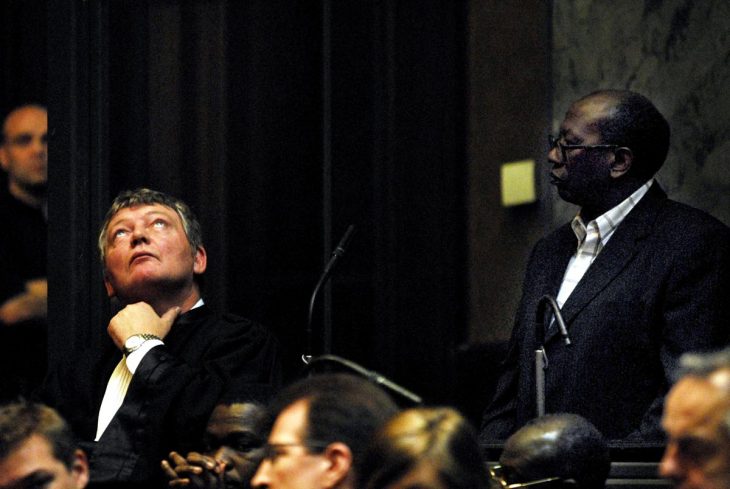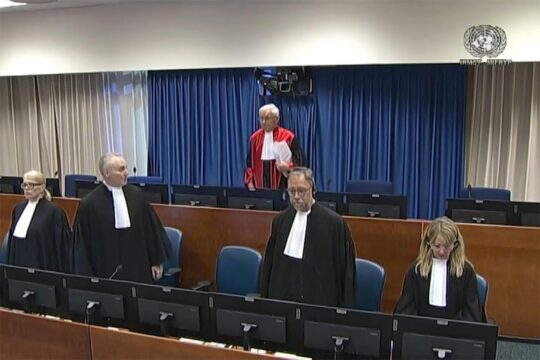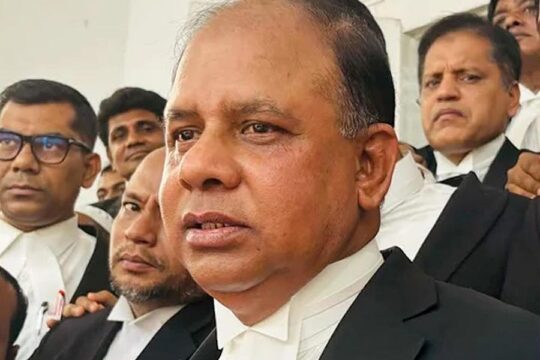As the 25th anniversary of the genocide approaches, legal action seems to be on the increase.
Two new trials are on the horizon in Belgium. On December 6, 2018, a court in Brussels referred to trial five persons of Rwandan origin, who were prosecuted in two separate cases. They are being prosecuted for genocide and war crimes. This is a first, because in the first four cases tried in Belgium in connection with Rwanda, the charge was only war crimes. The five individuals can still appeal to the Supreme Court.
The Belgian cases
One of the two new cases is against former top economic official Fabien Neretse. Neretse, a former Rwandan coffee industry boss born in 1957, hails from the prefecture of Ruhengeri (north) and settled in Angoulême, western France, after the genocide. Well integrated, he even made a series of proposals to the city to fight juvenile delinquency.
But the man praised by his neighbours for social commitment was wanted by both Rwanda and Belgium. One early morning in June 2011, he was arrested at his home. Two months later, he was handed over to the Belgian courts, which prosecuted him for the murder, in April 1994, of a Belgian-Rwandan family. Belgian Claire Beckers, her Rwandan husband Isaiah Bucyana and their daughter Katia were killed in the first days of the genocide. Neretse is accused of denouncing them and having them arrested at a roadblock while they were trying to seek refuge with the UN mission in Kigali, the Rwandan capital.
Neretse was also wanted by Rwanda. According to the Rwandan indictment of 2007, he is accused of distributing weapons to Interahamwe militiamen, providing them with money and means of transport for their deadly attacks against Tutsis.
The best known person in the second case is Mathias Bushishi, a former public prosecutor in Butare, southern Rwanda. Born in 1940, Bushishi is accused of having participated, on May 31,1994 in Butare, in a security council meeting to plan the extermination of Tutsis in the area. In Butare prefecture, where mixed marriages between Hutus and Tutsis were more widespread than elsewhere in the country, the genocide began several days later than in other regions.
Mathias Bushishi was arrested in Brussels on April 18, 2011 and held in Forest prison until February 17, 2012, when he was released on bail with judicial supervision.
The Ntuyahaga case
In another move making headlines in Kigali and Brussels, the Belgian authorities on December 21 expelled Major Bernard Ntuyahaga to Rwanda. Rwandan Ntuyahaga was sentenced to 20 years in prison in July 2007 for his responsibility in the murder of ten Belgian UN peacekeepers in Kigali on April 7, 1994. These soldiers were in charge of security for the Rwandan Prime Minister at the time, Agathe Uwilingiyimana. The Belgian jury concluded that Ntuyahaga had the Belgian soldiers arrested and taken to "Camp Kigali" where they were massacred by elements of the Rwandan regular army. Agathe Uwilingiyimana was also murdered, but Ntuyahaga was acquitted of responsibility in her death.
What the former officer, now 67, feared most after his release last June, was repatriation to Rwanda. However, this is what happened, after his lawyers had exhausted all recourse. The case was even brought before the European Court of Human Rights (ECHR). The ECHR rejected his appeal after the Rwandan government had given written guarantees that it would ensure respect for Ntuyahaga's rights and freedoms. Ntuyahaga was, until his expulsion, in a detention centre. "If the person concerned is held accountable in his country for other facts, he would be subject, like any Rwandan citizen, to a fair trial guaranteed by national laws. This was the case for other genocide suspects extradited from various countries to Rwanda," said Dominique Ernould, spokeswoman for the Belgian Office for Foreigners.
Major Ntuyahaga is now at the Mutobo "camp", where he is to spend three months learning lessons such as "the history of Rwanda and the causes of the genocide against the Tutsis". With him are hundreds of former combatants of the rebel Democratic Forces for the Liberation du Rwanda (FDLR), forcibly repatriated from the Democratic Republic of Congo (DRC).
Danish extradition
Ntuyahaga is not the only Rwandan sent back to their country of origin last month. Wenceslas Twagirayezu was extradited by Denmark on December 11 for trial by a Rwandan court. Twagirayezu, who arrived in Denmark in 2001, is accused by Rwandan judicial authorities of genocide, extermination and murder as crimes against humanity. The prosecutor claims that this former teacher was also a militia leader in Rubavu district, in the former Gisenyi prefecture. According to the prosecution, he directed attacks against Tutsis in several places in the region, including the parish church of Busasamana, where at least 1,000 Tutsis who had sought refuge there were killed. Now 50 years old, he is the second Rwandan to be extradited from Denmark after Emmanuel Mbarushimana, who was sent back to Kigali in 2014 and sentenced three years later to life in jail.
Belgium, the former colonial power in Rwanda, has often been accused of sowing the seeds of ethnic hatred and racism that led to the 1994 genocide. The accusations against France are even more serious. On April 5, 2014, in an interview with Jeune Afrique, Rwandan President Paul Kagame accused France of having played a "direct role in the preparation of the genocide" and even “in its implementation".
Two upcoming trials in France
Since 1994, the French justice system has held two trials against Rwandans suspected of having participated in the genocide. On December 24, an investigating judge ordered the referral to trial of former prefect of Gikongoro (southern Rwanda) Laurent Bucyibaruta, which may now be appealed. According to the ordinance, the former administrative boss, born in 1944, was "an accomplice to a massive and systematic practice of summary executions" in his prefecture. The French magistrate, on the other hand, partially dismissed charges that he was involved in the murder of a gendarme and three priests, as well as rapes. Bucyibaruta, a refugee in France since 1997, was also indicted by the International Criminal Tribunal (ICTR), which closed its doors at the end of 2015. The ICTR delegated Bucyibaruta's case to the French courts as well as that of Father Wenceslas Munyeshyaka, another Rwandan resident in France who was charged for his role in the genocide. The dismissal of the case against him was confirmed in June 2018. The ICTR and the Rwandan government have complained about the slowness of procedures in France.
Another trial expected in France is that of doctor Sosthène Munyemana, who has been working for 17 years as an emergency doctor in a hospital in Villeneuve-sur-Lot, southwestern France. The doctor, now 63 years old, is accused of having "voluntarily supported the interim government by signing a motion of support on April 16, 1994, 10 days after the genocide began". He is also accused of being "locally involved in the Tumba crisis committee on April 17, 1994, adopting the rhetoric of 'insecurity' and helping put in place the tools of genocide such as roadblocks and patrols". Finally, he is charged with "taking the key to the main local administrative building to lock up Tutsis who subsequently disappeared after their transfer to the Butare gendarmerie brigade". His lawyers have launched an appeal.
FRANCE ABANDONS HABYARIMANA PLANE CRASH INVESTIGATION
After some 20 years’ of investigations, French judicial authorities on December 21 announced the abandonment of inquiries into the April 6, 1994 attack on late Rwandan president Juvénal Habyarimana’s plane that sparked the genocide. The judges thus accepted the request of deputy prosecutor Nicolas Renucci, who had asked for the case to be dropped against members of current Rwandan president Paul Kagame’s entourage. According to the decision, there is no evidence to place responsibility for this attack on the former rebel Rwandan Patriotic Front (RPF) led by Kagame.
“The charges against those under investigation do not justify a referral to the criminal court and the said persons should benefit from reasonable doubt,” the prosecutor concluded in his final arguments on October 10, 2018.
A diplomatic storm
The April 6, 1994 attack killed the Rwandan and Burundian heads of state and the three French members of the presidential plane crew, among others. A first French investigation, conducted by Judge Bruguière, led to arrest warrants in 2006 for nine people close to President Kagame. The case was subsequently taken over by investigating judges Marc Trévidic and Nathalie Poux, whose investigations went in directions that seemed to contradict those of Bruguière.
"The exhaustive investigations carried out over the past 20 years have made it possible to explore many leads, uncover manipulations and collect many testimonies, often providing contradictory information on the events that affected Rwanda in 1994," the deputy prosecutor stressed. "The latest testimonies accusing RPF officials, gathered at the very end of the judicial investigation, were no more convincing, both because they came particularly late and because they are not supported by any material evidence.”
The attack investigation has been at the heart of sometimes very stormy diplomatic relations between Rwanda and France. Its abandonment will therefore help to calm relations between the two countries. But the decision is deplored by civil parties. "This decision by the French judges must be interpreted as a form of surrender in the face of a political context against which the public prosecutor's office has been unable to fight. The Rwandan authorities have never sought to help uncover the truth," Philippe Meilhac, lawyer for the widow of former President Habyarimana, told AFP. The French lawyer had denounced a "political" approach as soon as the prosecutor's submissions were filed, just as the lawyers for the accused have always denounced a political enterprise orchestrated by the French authorities. Not everything has yet been settled, since the civil parties have announced that they will appeal. But the mystery of who downed the plane will probably never be solved by the French courts.







